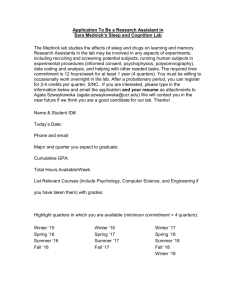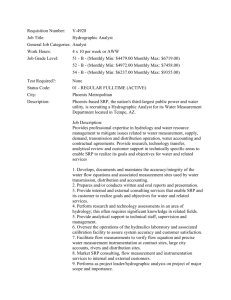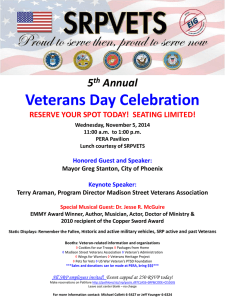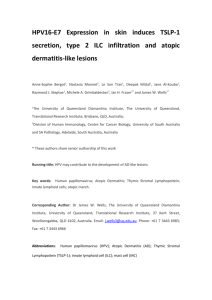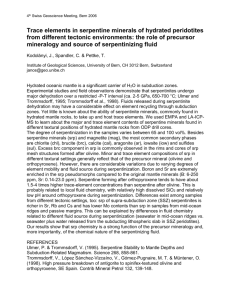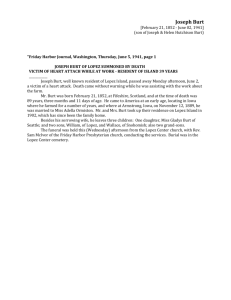2010 Interviews - Society for Research in Psychopathology
advertisement
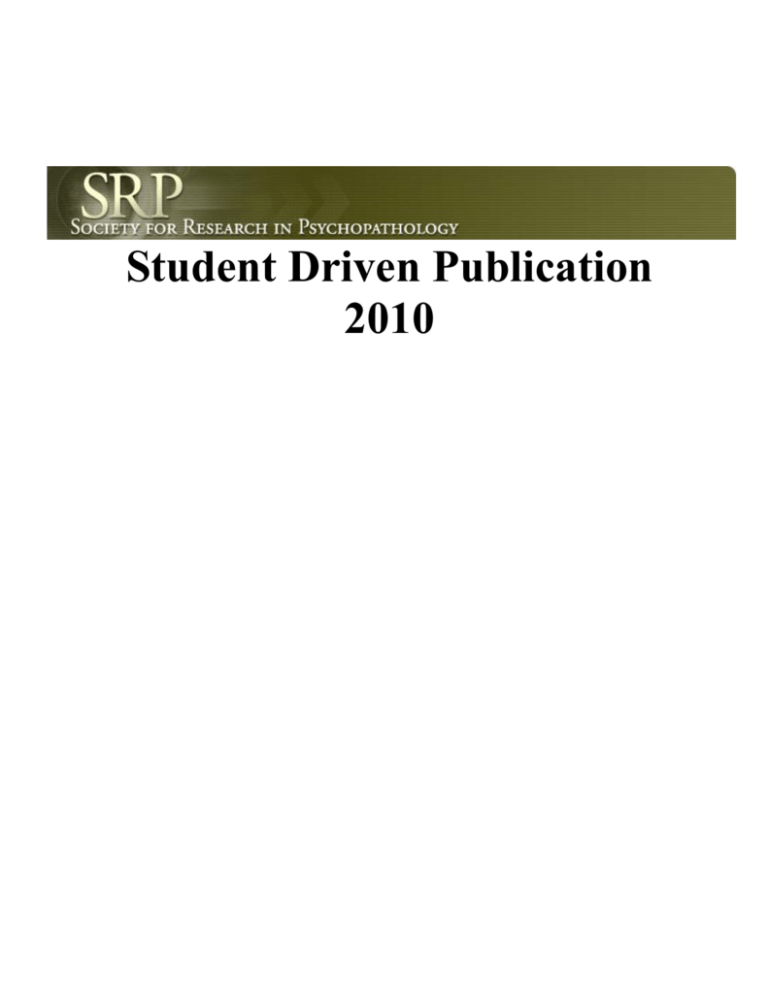
Student Driven Publication 2010 Dr. Sarnoff Mednick, 1996 SRP Zubin Award Winner Maureen P. Daly, Brooklyn College-CUNY Emily Kline, UMBC arnoff Mednick, Professor Emeritus at the University of Southern California, is a prominent member of SRP widely known for his contributions to the field of schizophrenia research. His pioneering high-risk birth cohort studies highlighted the role of fetal neural development in the pathogenesis of schizophrenia and set in motion longitudinal studies with collaborators internationally. Since the early part of his career, Dr. Mednick has also demonstrated expertise in the fields of antisocial behavior and creativity. We had the pleasure and privilege of sitting with Dr. Mednick during the 2010 SRP conference to discuss his career trajectory, accomplishments, and advice for young scholars. S associative elements into new combinations which either meet specified requirements or are in some way useful. The more mutually remote the elements of the new combination, the more creative the process or solution” (Mednick, 1962, p. 221). Dr. Mednick also developed a broadly used measure of creativity, the Remote Associates Test, which we spent the latter half of the interview attempting to complete. Dr. Mednick was born and raised in the Bronx, NY to Russian Jewish parents who had immigrated to the United States in their youth. In 1948, Dr. Mednick earned his Bachelor’s degree from City College of the City University of New York. During that time, City College served as an intellectual and creative hub for a young generation of scholars. Dr. Mednick fondly recalls the “fabulous” professors and spirited dining hall political debates that enriched his undergraduate years. After completing a Master’s degree in psychology at Columbia University, Dr. Mednick followed the advice of his mentor Gardner “God” Murphy and completed his Ph.D. at Northwestern University in 1954. When asked about the most fun experience of his long career, Dr. Mednick recalled the months he spent in Mauritius in the 1960s. With the collaborative efforts of researchers such as Fini Schulsinger and Adrian Raine, Dr. Mednick applied funding from the Danish government and the World Health Organization to not only implement a longitudinal research program, but also to improve the infrastructure of Mauritius. To overcome barriers to recruitment, Dr. Mednick and others established a preschool for children in the area, which also served as a research center. Dr. Mednick maintains that it is through collaborations such as these that he has amassed such an impressive and persistent record of productivity. Students, especially, have been essential to his productivity, as many of his own graduate students have been able to “take the reins” of projects he initiated, and go on to make important contributions. “Give time to supervision,” he advises, “it pays off.” In response to our request for advice for current graduate students, he wisely instructed that we “try to learn a few stats.” Even during the early years of his career, Dr. Mednick applied his broad scientific knowledge to the development of innovative research programs in seemingly distinct areas. In our conversation with Dr. Mednick, he regarded his studies and insights into the process of creativity as his proudest accomplishments. Dr. Mednick’s work on creativity began in1958 while, as a Visiting Assisting Research Professor at the University of California, Berkeley, he interviewed visiting mathematicians and architects regarding their own creative processes. Drawing on the interviews, as well as theories of British associationists, Dr. Mednick generated the associative theory of creativity. In his widely cited “favorite” paper, Dr. Mednick defines creativity as “the forming of Although he is officially retired from his faculty position at USC, Dr. Mednick continues to work with collaborators and examine new directions in the field. Most recently, he published a study with researchers at the University of Oslo on the effects of the Chernobyl disaster on Norwegian teens exposed in utero to radiation. We look forward to following his future work and the research of those who are furthering his advances in the field. Throughout our interview and the conference, Dr. Mednick was a gracious and humorous presence. It was truly a delight to become acquainted with him and to hear his perspectives on his career specifically, and the field of research in psychopathology in general. Dr. Thomas Oltmanns, 2009 SRP President Yuliya Kotelnikova, The University of Western Ontario Katie Ragsdale, University of Central Florida P rior to presenting his presidential address, Dr. Thomas Oltmanns, Edgar James Swift Professor of Psychology in Arts and Sciences and Professor of Psychiatry at Washington University, was introduced as an individual with a great personality that leaves people feeling better about themselves. Dr. Oltmanns has made tremendous contributions to the study of psychopathology, as well as to SRP while president this past year. We were able to catch up with Dr. Oltmanns to discuss the future direction of SRP, the new structure of the DSM, and to take in his words of wisdom for new students in the field. We opened our discussion with Dr. Oltmanns by seeking his opinion on the talks presented at the current meeting and new directions for SRP. He excitedly admitted that the talks reflected increasingly complex models of human behavior, as illustrated by Dr. Elaine Walker in her Zubin Award address. Dr. Oltmanns was particularly impressed with the cutting edge quantitative methods that were discoursed earlier that day at the symposia on personality and dimensional conceptions of psychopathology. He emphasized that SRP needs to reflect current activity in the labs; as he very succinctly put it: “We just need to hire the smartest people and go where they go.” When asked about his opinion on categorical versus dimensional structure of the DSM, Dr. Oltmanns stated that it is “pretty much a done deal,” in that people almost uniformly agree that mental disorders can no longer be described as dichotomous. He suggested that the true question is whether to define disorders from the perspective of traits or latent constructs. Dr. Oltmanns then added that understanding the real life consequences of disorders could provide clues regarding how to define them. He is currently considering following up with his peer nomination study participants to evaluate the consequences that their personality disorders may have had on their careers in the army. We next spoke with Dr. Oltmanns about the most influential figures in his academic career and his general thoughts on the mentorship process. Dr. Oltmanns was very enthusiastic to share stories regarding individuals he credits as having contributed influentially to his academic career. Without his interaction with Mavis Hetherington, SRP may have never had the opportunity to benefit from Dr. Oltmanns research. When he was a history major at the University of WisconsinMadison, he wandered into Dr. Hetherington’s Introduction to Psychology course, and emerged an inspired person of science. Following an inevitable switch of major, he took a small seminar with Dr. Loren Chapman who inspired his interest in research. Following an article review, he said to his class, “I hope by now you understand that you can do better research than people in the field,” which has resonated with Dr. Oltmanns to this day. Dr. Oltmanns also credits his success to Dr. John Neale, the first person to receive an APA Early Career Award in Psychopathology, and his mentor at Stony Brook University. He described Dr. Neale as great to work with; he learned from him the valuable lesson that “if you work with someone you like, then the work is not hard.” Dr. Oltmanns also expressed gratitude on the opposite side of a mentor-mentee relationship and spoke specifically about his former graduate students Dr. Susan South and Dr. Steve Balsis. He declared that the most rewarding aspect of working with students is to watch the transformation of an excited new graduate student toward a successful researcher and psychologist. He enjoys the innovation and enthusiastic input that students bring to research projects. He mentioned that choosing a graduate student is quite different from choosing a research assistant. He wants students to bring new ideas, knowledge and perspectives to the table towards facilitating the evolution of a project into directions it would not have otherwise travelled. At the close of the interview, we asked Dr. Oltmanns to share advice for new students entering the field. He advised that when you constantly “cannot stop thinking or talking about your career, then you know that you’re truly doing what you are destined to do.” He reminded us to feel privileged to be in such an exciting, rewarding and innovative field, as few people truly get to do what they love. Dr. Michael Pogue-Geile, 2010 SRP President Christie Spence, Washington University in St. Louis M ichael Pogue-Geile, incoming president of SRP for 2010-2011 is an Associate Professor in the Department of Psychology and the Department of Psychiatry, and Director of the Clinical Psychology program at the University of Pittsburgh. As a leading schizophrenia researcher he serves on the editorial board of Behavior Genetics and as editorial consultant for the American Journal of Psychiatry, Journal of Abnormal Psychology, Neuropsychiatric Genetics, Schizophrenia Bulletin, Schizophrenia Research, and Biological Psychiatry. He was also recently elected as the president of the Behavior Genetics Association for 2010-2011. Dr. Pogue-Geile has been a member of SRP from its inception. He fondly recalls meeting with Elaine Walker, Phil Harvey and others in Ithaca in 1985 to talk about positive and negative symptoms in schizophrenia. He describes this meeting as “a great and stimulating time” that felt like a lot more fun than other meetings he had attended. The group’s synergistic enthusiasm led to the idea of forming a society and meeting on a regular basis towards creating opportunities to have more such discussions. This small group of colleagues with shared interests agreed to meet again the following year at Harvard, and the rest is SRP history. Some of Dr. Pogue-Geile’s favorite conference memories involve poolside parties in Miami and nightclub hopping in Atlanta…after the conclusion of conference events. As a graduate student at Indiana University, Dr. PogueGeile was initially interested in cross-cultural psychology. At the time, Indiana graduate students were not immediately matched with advisors. Rather, students had opportunity to rotate through labs to discover their interests. After rotating in the lab of outgoing president Thomas Oltmanns, Dr. Pogue-Geile’s love for schizophrenia research began. Working with this clinical population proved to be very rewarding for Dr. PogueGeile and sustained his interest throughout the years, as is evident from his many influential publications. In addition to his productive research schedule, Dr. Pogue-Geile greatly enjoys mentoring students. The “fun part” of his mentorship is when students ask questions that make him think about things in a light he had not previously considered. He described the most satisfying part of mentoring as watching students advance, “do their own thing” and become independent researchers. As incoming SRP president, Dr. Pogue-Geile is very excited about a number of important tasks for the Society. SRP is now a substantively larger and more complex society than it was in the 1980s. In Dr. PogueGeile’s estimation, “the people who were around at the beginning are passing the baton to a newer generation.” While this type of growth does present challenges, Dr. Pogue-Geile is ready to meet them. He shared the sentiment that as the membership continues to expand, it becomes increasingly important to make institutional memory more formalized by putting information in writing. This process ensures that as the figurative baton is passed to younger members they will continue in excellent service. Dr. Pogue-Geile’s main goal as president is to maintain the current momentum and involvement of members. He is very impressed with the attendance at meetings, especially that of students. In terms of specific aims, he hopes to further promote student involvement and potentially increase international involvement. Another goal is to increase collaborations with other societies. Although Dr. Pogue-Geile does have some specific goals for the upcoming year, he stresses that maintaining the society’s current energy and impressive sense of collegiality are his primary tasks. To students entering the field, Dr. Pogue-Geile suggests choosing a big question that “they are really interested in and can maintain excitement for over the years,” much like he did with the topic of schizophrenia. He adds that “life is short” and students should be working on things that they really want to work on and things that are big. Additionally, he suggests keeping up with the literature to be knowledgeable about what other scholars are doing in the field. If his career is a testament to the wisdom of his advice, then we would all be well served to take note. Dr. S. Alexandra Burt, 2010 Early Career Award Winner Kimberly Arditte, University of Miami T his fall Dr. S. Alexandra Burt was named the 2010 SRP Early Career Award winner in recognition of her work on the gene x environment interplay in the development of antisocial behaviors across the lifespan. Dr. Burt, Associate Professor of Psychology at Michigan State University, completed her Ph.D. in Clinical Psychology and Behavioral Genetics at the University of Minnesota, Minneapolis in 2004. In the short time since her graduation, Dr. Burt has already accomplished a great deal. She has published more than 60 journal articles and book chapters and is a member of the editorial boards for Aggressive Behavior, Frontiers in Child and Neurodevelopmental Psychiatry, and Personality Disorders: Theory, Research, and Treatment. SRP has not been the only organization to recognize Dr. Burt’s achievements. In 2009, she was the recipient of the Fuller and Scott Early Career Award given by the Behavioral Genetics Association. At this SRP annual meeting, I had the pleasure of sitting down with Dr. Burt to talk about her experiences as a researcher and academician. Dr. Burt’s passion for research began during the completion of her undergraduate honors thesis at Emory University. Though the topic of the project was not something she would go on to study during graduate school, she was fascinated by the process of conducting research. “I loved the idea that you could use data to answer questions and better understand the world around you,” she explained. “From that point on, I knew I wanted to pursue a career in research.” Figuring out what she wanted to study took a bit longer. Dr. Burt credits the freedom allotted to her during her graduate training to the exploration and development of her own interests within the field of behavioral genetics. Currently, Dr. Burt’s research focuses on understanding how genetics are influenced by environmental context and how these factors may, in turn, impact antisocial behavior. She is a Principal Investigator of the Michigan State University Twin Registry, which was created in an attempt to examine the interactive roles of genetic and environmental risk in the development of antisocial behaviors. In addition, Dr. Burt has become very interested in understanding how potential subtypes of antisocial behavior, specifically aggressive and rule-breaking behavior, may differ among adolescents. When asked about what she likes most about having a career in academia, Dr. Burt appeared to have some difficulty deciding. After taking a moment to reflect, she confided that the best part of her job was the flexibility it provided. “You’re your own boss,” she said. “You get to pursue your own intellectual interests and if you get bored with them, you can move on to the next topic.” Teaching and mentoring students were also at the top of her list. Watching her students become successful researchers is particularly rewarding for Dr. Burt, who loves seeing their excitement when their first paper is published. In addition, she appreciates how her own research ideas have grown and expanded in new and exciting ways as she has worked with her students to develop their ideas. As one of her students became interested in the topic of parenting style, so too did Dr. Burt realize that she would be interested in studying how biology may influence one’s parenting behaviors. In terms of advice for students, Dr. Burt imparted two pearls of wisdom. The first was a piece of practical advice. “Try to make everything you do count twice,” she said. If you write a paper for class, explore the possibility of getting it published. If you do clinical work as part of a research protocol, see if you can count the hours for internship applications. Though you may not always be able to do this, the graduate students who try will always be better off. Her second piece of advice was of the inspirational sort. Getting negative feedback or criticism on your work can be difficult, but it is part of the process. Instead of feeling hurt, use this feedback as a challenge to make yourself and your research stronger. Every student, every faculty member, every person, struggles with something during their career. Whatever your weakness, don’t let it get you down. Work on it until you become better at it.
